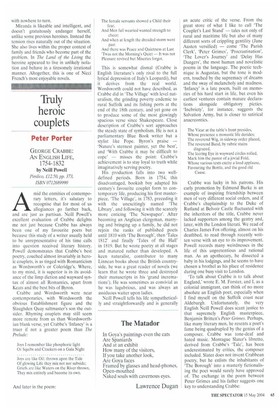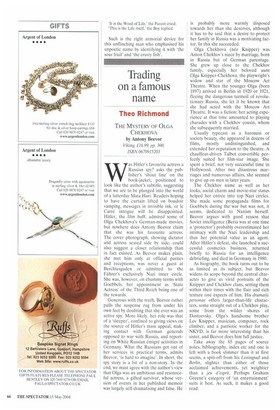Truly heroic couplets
Peter Porter
GEORGE CRABBE: AN ENGLISH LIFE, 1754-1832 by Neill Powell Pimlico, .i12.50, pp. 373, ISBN 0712684990 Amid the enmities of contemporary letters, it's salutary to recognise that for most of us allegiances go farther back, and are just as partisan. Neill Powell's excellent evaluation of Crabbe delights me not just because Crabbe has always been one of my favourite poets but because this study of a writer usually held to be unrepresentative of his time calls into question received literary history. Powell demonstrates that Crabbe's best poetry, couched almost invariably in heroic couplets, is as tinged with Romanticism as Wordsworth's or Coleridge's. Where, to my mind, it is superior is in its avoidance of the limp diction and wayward syntax of almost all Romantics, apart from Keats and the best bits of Byron.
Crabbe and Wordsworth were near contemporaries, with Wordsworth the obvious Establishment figure and the Slaughden Quay saltmaster's son the outsider. Rhyming couplets may still seem more remote from us than Wordsworthian blank verse, yet Crabbe's 'Infancy' is a truer if not a greater poem than The Prelude:
Joys I remember like phosphoric light Or Squibs and Crackers on a Gala Night Joys are like Oil: thrown upon the Tide Of glowing Life they mix not nor subside; Griefs are like Waters on the River thrown, They mix entirely and become its own. The female servants showed a Child their fear, And Men full wearied wanted strength to cheer; And when at length the dreaded storm went past And there was Peace and Quietness at Last 'Twas not the Morning's Quiet — It was not Pleasure revived but Miseries forgot.
This is somewhat dismal (Crabbe is English literature's only rival to the full lyrical depression of Italy's Leopardi), but it derives from the real world. Wordsworth could not have described, as Crabbe did in 'The Village' with level naturalism, the grinding poverty endemic to rural Suffolk and its fishing ports at the end of the 18th century, and yet gone on to produce some of the most glowingly spacious verse since Shakespeare. Close description of Crabbe's sort approaches the steady state of symbolism. He is not a parliamentary Blue Book writer but a stylist like Pope. Byron's praise — 'Nature's sternest painter, yet the best', and 'With Crabbe it may be difficult to cope' — misses the point: Crabbe's achievement is to stay loyal to truth while imaginatively serving poetry.
His production falls into two welldefined periods. Born in 1754, this disadvantaged, bookish boy adapted his century's favourite couplet form to contemporary life, producing his first masterpiece, The Village', in 1783, preceding it with the unexcitingly named The Library', and following it with the scarcely more enticing 'The Newspaper'. After becoming an Anglican clergyman, marrying and bringing up a family, he did not rejoin the ranks of published poets until 1810 with 'The Borough', then 'Tales 1812' and finally 'Tales of the Hall' in 1819. But he wrote poetry at all stages and matured rather than developed. A keen naturalist, contributor to many Linnean books about the British countryside, he was a great reader of novels (we learn that he wrote three and destroyed their manuscripts in his 'grand incremations'). He was sometimes as convivial as he was lugubrious, and was always an assiduous waiter upon ladies.
Neill Powell tells his life sympathetically and straightforwardly and is generally an acute critic of the verse. From the great store of what I like to call 'The Couplet's Last Stand' — tales not only of rural and maritime life but also of many different sorts of crippling gentility (Jane Austen versified) — come 'The Parish Clerk', 'Peter Grimes', 'Procrastination', 'The Lover's Journey' and 'Delay Has Dangers', the most human and novelistic poems in the language. The poetic technique is Augustan, but the tone is modern, touched by the supremacy of dreams and the sway of melancholy and madness. 'Infancy' is a late poem, built on memories of his hard start in life, but even his earliest ventures contain mature declara tions alongside obligatory pieties. 'Inebriety', for instance, suggests the Salvation Army, but is closer to satirical anacreontics.
The Vicar at the table's front presides, Whose presence a monastic life derides; The reverend Wig, in sideway order placed, The reverend Band, by rubric stains disgraced, The leering Eye in wayward circles rolled, Mark him the pastor of a jovial Fold, Whose various texts excite a loud applause, Favouring the Bottle, and the good old Cause.
Crabbe was lucky in his patrons. His early promotion by Edmund Burke is an example of inspiring friendship between men of very different social orders, and if Crabbe's chaplainship to the Duke of Rutland at Belvoir Castle fluctuated with the inheritors of the title, Crabbe never lacked supporters among the gentry and, later, with the London literati. We read of Charles James Fox offering, almost on his deathbed, to read through recently written verse with an eye to its improvement. Powell records many weirdnesses in the life of this unpretentious and rational man. As an apothecary, he dissected a baby in his lodgings, and he seems to have chosen a brothel as his place of residence during one busy visit to London.
'To talk about Crabbe is to talk about England,' wrote E. M. Forster, and 1, as a colonial immigrant, can think of no more absolute an English poet, especially when I find myself on the Suffolk coast near Aldeburgh. Unfortunately, the very English Neill Powell does scant justice to that supremely English masterpiece, Benjamin Britten's Peter Grimes. Perhaps, like many literary men, he resents a poet's fame being quadrupled by the genius of a composer. Crabbe was tone-deaf and hated music. Montague Slater's libretto, derived from Crabbe's 'Tale', has been underestimated by critics, the composer included. Slater does not invent Crabbean poetry, but he enlists the inhabitants of 'The Borough' into a masterly fictionalising the poet would surely have approved of. The exchange in the poem between Peter Grimes and his father suggests one key to understanding Crabbe:
'It is the Word of Life,' the Parent cried; 'This is the Life itself.' the Boy replied.
Such is the right armorial device for this unflinching man who emphasised his unpoetic name by identifying it with 'the sour fruit' and 'the crusty fish'.



































































































 Previous page
Previous page